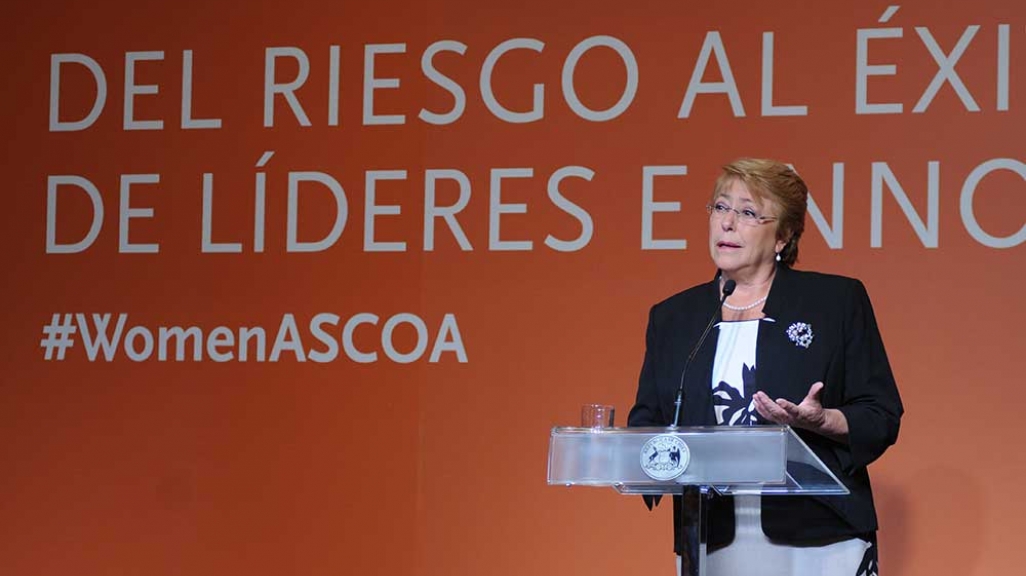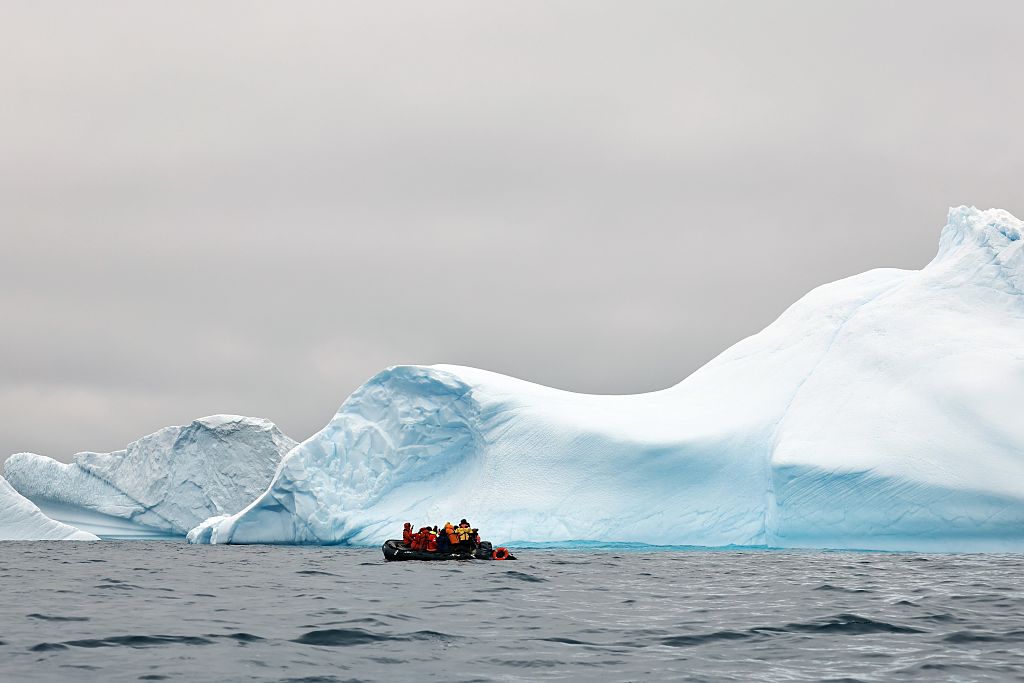#womenASCOA Summary: Bachelet on Closing the Gender Gap – "If We Want to, We Can"
#womenASCOA Summary: Bachelet on Closing the Gender Gap – "If We Want to, We Can"
Chile’s president joined other leaders to take account of the progress and pending obstacles to the economic and social inclusion of women.
Speakers:
- Michelle Bachelet, President of Chile
- Marisol Alarcón, Partner & Chile Executive Director, Laboratoria
- Scarlett Alvarez, Vice President and Global Chief Stakeholder & Sustainability Officer, The AES Corporation
- Karen Bruck, Director Sales Corp, MercadoLibre
- Mónica Contreras, President of Andean Countries Foods, PepsiCo
- Adolfo Corujo, Chief Talent & Innovation Officer and Partner, Llorente & Cuenca
- Violeta Domínguez, Coordinator of Inclusion and Gender Equity Unit, CAF
- Mónica Duwe, Chief Executive Officer, HSBC Chile Bank
- Susan Greenwell, SVP & Head of International Government Relations, MetLife
- Carol Z. Perez, U.S. Ambassador to Chile
- Carmen Román, General Counsel, Walmart Chile
- Consuelo Saavedra, Journalist
- Susan Segal, President and CEO, Americas Society/Council of the Americas
Lea la version del resumen en español.
Closing the gender gap in the workforce is “smart economics,” said Chilean President Michelle Bachelet at the first AS/COA Women’s Hemispheric Network Conference in Santiago de Chile.
In 2012, Bachelet helped AS/COA President and CEO Susan Segal launch the network in New York. In her opening remarks at the conference, Bachelet highlighted why the initiative is still relevant, if not more so. While the number of women entering the workforce and assuming political posts has increased in Latin America, there’s still a significant lag, particularly in the private sector. “We can count on our hands the number of companies that have more than one female director,” Bachelet said. For this reason, she explained, there have to be initiatives that specifically focus on closing the gender gap. All it takes is the will to do it. “If we want to, we can,” she said.
Pdta. @mbachelet: "Hoy, qué duda cabe, las mujeres tenemos más poder que antes. La misión, es seguir extendiéndolo" #WomenASCOA
— Prensa Presidencia (@presidencia_cl) March 7, 2017
Following her remarks, the journalist Consuelo Saavedra moderated a panel of female executives, who described their personal connections to the issue of female empowerment. They also discussed the different abilities men and women have and the benefits derived from combining these in work teams. Regarding networking in particular, women could learn from the strategies of men and be more direct and emphatic, Scarlett Alvarez of AES said. But creating a network isn’t only about establishing relationships with your superiors, Mónica Duwe of HSBC pointed out; it's about expanding it among your peers.
Cuando hombre recibe oferta laboral, negocia Cuando mujer recibe oferta laboral, dice gracias (experiencia de Gerenta en #womenascoa @ASCOA
— paula molina (@paulamolinat) March 7, 2017
The female professionals also noted the progress they’ve seen in their own companies and countries. Mónica Contreras of PepsiCo talked about the laws in Colombia that have increased the political representation of women via quotas, though she said multinational companies had made less progress. On the other hand, Susan Greenwell pointed out MetLife’s strides in Latin America, where women head three of the six markets in which the company is present.
Tome nota: una carrera se arma con pares y un equipo, la trabajo en red es fundamental #womenascoa
— Susana Romero A. (@PsicologaSira) March 7, 2017
The second panel of the day focused on entrepreneurship, innovation, and risk taking. Marisol Alarcón spoke about the model Laboratoria Chile had adopted for empowering female entrepreneurs, arming them with data to help them make informed decisions and lose the fear of failure. Similarly, Violeta Domínguez explained how the CAF development bank had opted for technically training employees, especially in fields like banking where there are less women.
#WomenASCOA Carmen Roman Walmart Cambios de paradigmas, mecanismos para implementar presciencia de la mujer en cargos ejecutivos pic.twitter.com/r3wTWw82AD
— Pilar Meza (@PilarMezaBiz) March 7, 2017
To close the panel, moderator Adolfo Carujo of Llorente & Cuenca asked speakers to highlight a particular ability women have that should be developed or taken advantage of. For Walmart’s Carmen Román, women contribute much creativity and determination to a team. MercadoLibre’s Karen Bruck said women should be more confident in their ability to take on analytical roles. Corujo himself posited that women have a distinct ability to create consensus. “To innovate and launch new companies, consensus is crucial,” he said.
The passion in the room is notable! The upside of women in the workforce is enormous! #womenascoa
— Susan Segal (@s_segal) March 7, 2017
The U.S. Ambassador to Chile Carol Perez gave the closing remarks of the day’s event, sharing her personal experience growing up in a family that always supported her without making distinctions between the genders. She also spoke of Chile’s advancements in closing the gender gap, as it has in the diplomatic sphere where women make up more than 25 percent of ambassadors.
''Encantada de participar junto a presidenta @mbachelet y @s_segal en seminario internacional #WomenASCOA'', #EmbCarol #XqSomosMujeres pic.twitter.com/Dk80dVAM9Y
— Embajada EEUU Chile (@EmbajadaEEUUcl) March 7, 2017
Yet the world in general has a long way to go, she noted, pointing out that it will be at least 70 years before the gender gap is closed according to the International Labour Organization (ILO). “The considerable advances women have made in education over the last two decades have not translated into comparable improvements in the labor force,” she said citing the ILO.
El día que la crianza culturalmente se asuma como algo de la madre Y el padre, empezará a bajar la brecha de género #womenASCOA
— Sacha Razmilic B. (@Sacharazmilic) March 7, 2017









